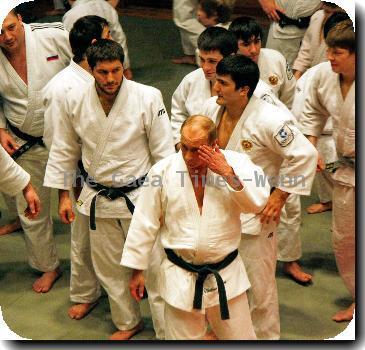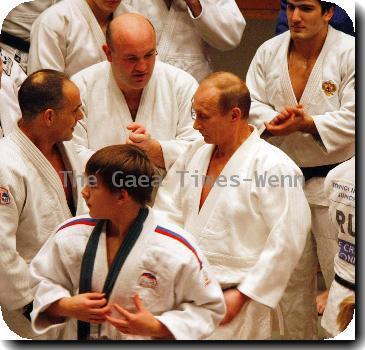Clinton calls on Russia to meet its cease-fire commitments in former Soviet state of Georgia
By Robert Burns, APMonday, July 5, 2010
Clinton criticizes Russia for occupying Georgia
TBILISI, Georgia — U.S. Secretary of State Hillary Rodham Clinton rebuked Russia on Monday for failing to live up to the cease-fire agreement it signed nearly two years ago to end the fighting in this small former Soviet state.
She asserted that Russia is occupying parts of Georgia and building permanent military bases in contravention of the truce.
“We’re calling on the Russians to enforce the agreement they signed,” she told a news conference with Georgian President Mikhail Saakashvili at her side. She said that includes pulling its troops back to the positions they held before the invasion.
Several times she pointedly referred to Russian troops as occupiers of the breakaway Georgian territories of South Ossetia and Abkhazia. She said the U.S. was “appalled and totally rejected” Russia’s rationale for the invasion, which temporarily put U.S.-Russian relations in a deep freeze and prompted NATO to suspend cooperation with Moscow.
“The United States is steadfast in its commitment to Georgia’s sovereignty and territorial integrity,” she said. “The United States does not recognize spheres of influence,” she added, referring to Russian President Dmitry Medvedev’s claim that his country has “privileged interests” and special influence in Georgia and other former Soviet states.
Georgia gained its independence in 1991 with the collapse of Soviet communism.
Asked about Clinton’s comments, Russia’s powerful Prime Minister Vladimir Putin warned Georgia against trying to rally U.S. support.
“They mustn’t seek solutions outside,” Putin said, according to Russian news agencies. “It’s necessary to conduct a dialogue without citing third parties.”
Russia wants to retain clout in the region as a counterweight to the eastward march of NATO, which in recent years has expanded its frontiers to include the former Soviet states of Latvia, Lithuania and Estonia. Ukraine also had been pursuing membership but reversed course this year with the election of a more Moscow-friendly government.
Clinton said she and Obama raised the Georgia issues with Medvedev when he was in Washington last month.
The invasion remains a major point of contention between Washington and Moscow. It complicates U.S. relations with Georgia, which has been skeptical of the Obama administration’s policy of adopting friendly relations with Moscow in an attempt to overcome the deep divides that developed during the administration of President George W. Bush.
Saakashvili told reporters, however, that upon further reflection he thinks Obama’s Russia policy is the correct one.
“It’s exactly the right way,” he said.
He and Clinton took a stroll through a portion of the oldest section of Tbilisi, stopping at a cafe to toast her visit with a glass of Georgian wine — a Teliani Valley satrapezo, according to Clinton’s aides. Saakashvili and Clinton seemed at ease with each other. He told her that on her next visit she should make a point of sampling the capital’s night life.
“I’m too old for your night life,” she said with a hearty laugh, and he replied, “That’s the first statement that I disagree with you on.”
Earlier, Clinton met with several hundred Georgian women leaders from a range of fields, including law and labor unions.
During a question-and-answer session, one woman asked if the Obama administration has a “real democracy agenda” for Georgia. She said her country suffers from a range of human rights abuses and that these were largely ignored by the Bush administration.
“The United States always has a democracy agenda,” Clinton responded. “Continuing to try to perfect democracy is one of the key challenges for any country — both its government and its citizens.” She applauded recent progress in Georgia, but added that the administration “raises as a friend” its concerns about limits on freedom of expression.
“We take seriously threats to democracy, wherever they occur,” Clinton said. “So we’re going to continue to support democracy here in Georgia.”
Another woman asked about Russia’s continued occupation of parts of Georgia.
The key for Georgia in dealing with the Russia problem, Clinton said, is to concentrate on improving its democracy and solving its internal problems and its economic prospects.
“That is the rebuke that no one can dispute,” she said. Her unspoken point seemed to be that Georgia should not contemplate any military solution in South Ossetia and Abkhazia. She advised that Georgia not take any actions that would offer Russia an excuse to perpetuate its occupation.
“I think it is a mistake to focus on the past,” she said, alluding to the remaining anger over the August 2008 invasion.
Clinton said the U.S. still supports Georgia’s bid for membership in the NATO military alliance.
Georgia was the final stop on a Clinton tour that began Thursday in Ukraine and also took her to Poland, Azerbaijan and Armenia. She was flying back to Washington to join Obama for a meeting Tuesday with Israeli Prime Minister Benjamin Netanyahu.
Tags: Democracy, Eastern Europe, Eu-clinton, Europe, Georgia, Military Occupations, Moscow, North America, Russia, Tbilisi, United States, Vladimir Putin

